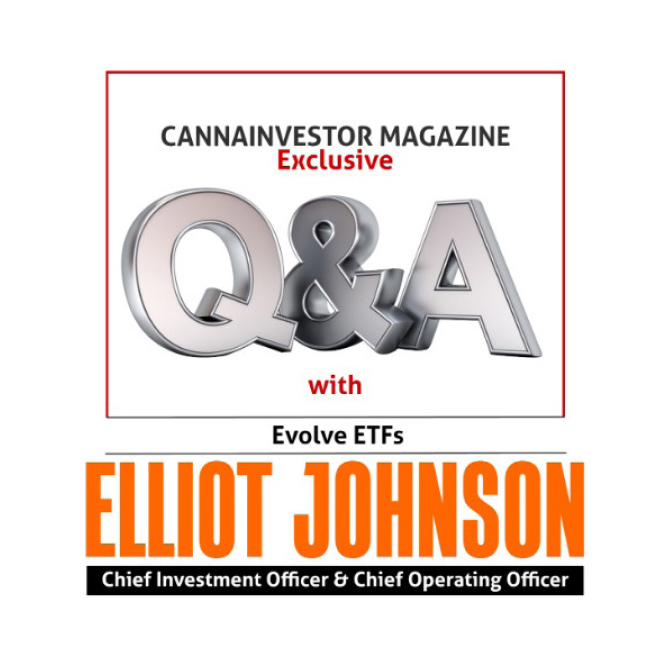Elliot Johnson, Chief Investment Officer and Chief Operating Officer of Evolve ETFs, was recently interviewed by Louis Kyron, Editor in Chief of CannaInvestor Magazine Canada. They discussed several aspects of investing in the cannabis sector and insights on how developments in the legalization process would affect the North American marijuana industry.
Below are some highlights of the Q&A:

CannaInvestor: Let’s just start off with a little Investor 101 before we dive into things.
I tend to think of an ETF as a “cousin” to a mutual fund. What is the distinction between the two and what is the attraction of choosing an ETF over a mutual fund?
Elliot Johnson: Great question!
In actual fact, an ETF is a mutual fund. An ETF is just a special kind of mutual fund that can be purchased on a stock exchange just like a regular stock. Both ETFs and mutual funds can invest in the same sorts of assets, typically stocks or bonds, and both are available for purchase by the general public
ETFs do, however, have some special features. For one, they are much easier to use as they are available on the stock exchange. You can buy and sell the same ETF in a single day and you always know the price. A mutual fund, however, is only available for purchase at the end of each day.
ln addition, ETFs typically charge a lower fee because they are more efficient. Often an ETF will track an index (known as a passive ETF), but actively managed ETFs are growing in popularity and compete directly with actively managed mutual funds but usually for a lower fee.
These cost differences and ease of use are reasons why ETF s are now outselling mutual funds in Canada. We believe it is a superior investment solution better suited to the digital world.
Elliot, I have kept in touch with Evolve since its inception and I cannot state enough what an absolute pleasure it was to be on a panel with yourself at the LIFT Expo in June. So, let’s get right at it.
I believe the two ETFs, relevant to our discussion, at Evolve would be the Evolve US Marijuana ETF (USMJ) and the Evolve Marijuana Fund (SEED).
I assume these are both actively managed? And for our readers what does it mean to be “actively managed”?
Yes, both USMJ and SEED are actively managed ETFs. Active management means that the fund doesn’t track an index but rather, we manage the portfolio by directly selecting which stocks to buy and sell and when to do so.
OK. Why do you believe it is important in the cannabis sector for a fund to be actively managed?
We chose an active approach for the cannabis sector because it is such a news-driven, volatile industry. It’s not uncommon for the price of a cannabis stock to move by 10% or more in a single day. In those circumstances, we believe it’s particularly important to be reacting to changes in the market to ensure appropriate portfolio construction is maintained at all times.
The problem with a passive, index approach to a volatile sector is that you end up holding the wrong things in the wrong amounts at the wrong time because an index will only rebalance a few times a year and will not take into account market conditions when it does so. This can exacerbate the volatility of your investment.
Sometimes volatility and news can coincide to provide wonderful opportunities as we saw in Canada last fall in the run-up to cannabis legalization on October 17th. We were well-positioned to take advantage of that rally and to take risk off the table when prices ran too far, too fast.
We’re on the lookout for similar opportunities as the cannabis industry in Canada continues to develop with the introduction of edible formats this fall and the global expansion of Canadian companies into new markets.
With the right approach, a volatile sector can actually benefit investors and that’s what we are trying to do with these products.
Elliot, can you tell me about the commonalities and the difference in your management process for these two funds?
We follow the same process for both SEED and USMJ. The difference between the two funds is simply where the companies operate: for SEED we exclude companies operating in the USA, but for USMJ we only look at companies operating south of the border.
So, our first step is to classify each company in order to define our investment universe from which each fund can draw. Sometimes this is a challenging task as companies are often buying and selling one another and can, therefore, move back and forth.
From that point, we perform portfolio construction activities in the same way for both funds. We divide up each market into larger, emerging and ancillary companies and then perform analysis on each company. The process we use to analyze, construct and weight the portfolios is the same though each fund will reflect its own market opportunities.
I believe that SEED is the top-performing unlevered Canadian equity ETF over the past year. Is that correct? What does it mean to be “unlevered”? And what would you attribute the success of this fund to?
Yes, that’s correct. We’re very proud of our track record.
“Unlevered” simply means we don’t borrow any money in the fund. Put another way, for every dollar in assets, we have a dollar in investments.
I think our success comes from a few factors. Firstly, we have a focus on this sector and our team is doing regular analysis and adjustments to the portfolio. Our background in trading volatile industries previously in our careers gives us a good foundation for investing in this market.
Secondly, we’ve found an approach that combines fundamental security analysis with quantitative portfolio construction and risk management techniques. We need to make sure we are not only investing in our best ideas, but doing so in a way that is mindful of price swings.
Finally, we are humble. We are willing to be wrong, or right at the wrong time! When that happens, we take corrective action and redouble our efforts. lt’s important to respect the market. lnvestors have entrusted us with their money and we intend to take care of it as if it were our own.
In this industry, where everything changes and often dramatically and on a dime, it seems like a long time ago but in fact, it was only April when Evolve launched the world’s first U.S. focused cannabis ETF. What opportunities are you seeing in the U.S. cannabis sector at this time?
We view the US market as a second chance for investors to be “first” in a developing market. There is a discrepancy in legislation surrounding cannabis in the US and as a result, large institutional investors are not yet able to participate. The same problem is preventing large-scale M&A activity from bringing larger consumer product companies such as alcohol, tobacco and food giants from buying in. It’s highly unusual for the retail investor to get the first look at an emerging sector, usually it’s the other way around. We think this is tremendously exciting because once the legal uncertainty is resolved we expect far more participation and a rise in valuations for U.S. cannabis companies.
OK, but what about the risks? It is not legal Federally and yes there are some bills in the queue such as ones declaring what is legal at the State level shall be equal at the Federal level, but such bills have some obstacles and hurdles. But let’s “what if” this and assume cannabis is rescheduled Federally and that this happens relatively soon.
What happens to all of the vertically integrated MSO’s? Surely production will move to where it’s the least expensive? How do you plan for such contingencies and what other risks are there? Brick and mortar clinics replaced with virtual ones etc?
I think you’re referring to the STATES Act which is currently in the process of going through congress. This bill would be the catalyst for true legalization in the US market.
As you mention, once that happens, multi-state operators will streamline their businesses. But we don’t see that as an investment risk, rather it is an opportunity. With legalization, we expect more participants and capital to flood into the market and we see that resulting in a great deal of shareholder value. We want to be there when that happens. Once again, this will be a news-driven change which is why we are active.
Alright. One last one on the U.S. In your opinion, what are the key drivers to the investment landscape in the U.S. from a legislation perspective?
The SAFE Act will provide nationwide banking services to multi-state operators. We think this is likely because the federal government will want to use banking to exert oversight.
The STATES Act, mentioned above, is the big one because the removal of federal prohibition changes everything. For example, we will see US companies move their listings to the NYSE, increased investment banking coverage, M&A, development of new products and so on.
With edible legalization coming in December and other CPG items, such as beverages, hitting the shelves this year, what should investors be looking out for? How are you preparing for this next wave of legalization in Canada?
It’s very exciting to see how this plays out in the full. We’re trying to find the companies that can execute on bringing products to market first and establishing a brand. Ultimately, it’s the development of the customer that matters most. We think there’s a strong first-mover advantage. That being said, we don’t know which formats will be the most successful so we are paying close attention.
Elliot, I have taken far too much of your time today, but I want to give you this opportunity to tell our readers why they should look at Evolve’s family of ETFs.
Thanks, Louis.
We founded Evolve with the idea that investors need better products to invest in where the world is going. We believe the one thing everyone needs in their portfolios is the future.
That’s why we launched a product line focused on disruptive innovation. Our first ETF was Canada’s First Cyber Security ETF (ticker CYBR). We created the World’s First Automobile Innovation ETF (ticker CARS), Canada’s First Innovation ETF (ticker EDGE) and most recently Canada’s First Electronic Gaming ETF (ticker HERO).
These products, along with our other funds, are designed to help investors prepare for where the world is going. We couldn’t be more excited about what the future holds.
About the interviewee:

Elliot Johnson, Chief Investment Officer, Chief Operating Officer, Evolve ETFs
Mr. Johnson is Chief Investment Officer and Chief Operating Officer with Evolve ETFs. Prior to joining Evolve ETFs, Mr. Johnson was Senior Vice President, Retail Markets at Fiera Capital Corporation, a prominent Canadian investment management firm. Prior to this role, Mr. Johnson served as Chief Operating Officer of Fiera Quantum Limited Partnership, an alternative investment manager. From 2010 to 2012, Mr. Johnson led technology management for a number of business lines at National Bank of Canada. Prior to 2012, he spent 13 years at GMP Capital Corp. in a variety of management roles across institutional brokerage, wealth management and asset management businesses. Mr. Johnson holds the Canadian Investment Manager (CIM) designation, the Derivatives Markets Specialist (DMS) designation and is a Fellow of the Canadian Securities Institute (FCSI). Mr. Johnson serves as a trustee on the boards of the Upper Canada College Foundation, and Trinity College at the University of Toronto where he is Chair of the Committee on Investments.
About CannaInvestor Magazine:

CannaInvestor Magazine is a monthly subscription-based digital magazine with an exclusive focus on Cannabis finance that delivers convenient insights on publicly-traded and privately-held cannabis companies through informative articles, company profiles, and market trends that inform and educate investors; attracting inquisitive, highly engaged digital audiences around the globe.

Louis Kyron, Editor in Chief, CannaInvestor Magazine (Canada)
Louis began investing in the early 1980s – before he was old enough to drive a car. From there, he ran a successful Investment Club. His 30+ relevant years of experience in Treasury, Financial Analysis, Securitization, Equities, Futures, and advanced money market instruments are now focused on the legal hemp and cannabis industry. When Louis was approached to be the editor of the Canadian edition of CannaInvestor Magazine, he found it both an honour and a privilege to be part of the team that he considers to be the most trusted source of timely and valued-added relevant information to investors. Louis is also an Associate Member of the Canadian Association of Journalists and an Observer Member of the Canadian Consortium for the Investigation of Cannabinoids.
